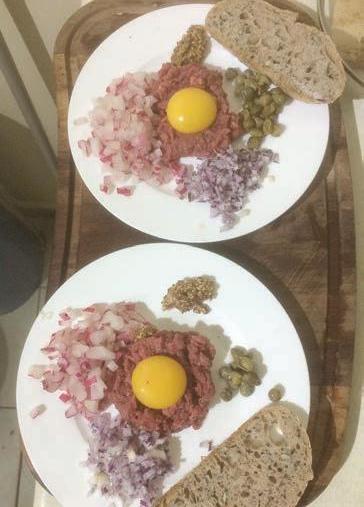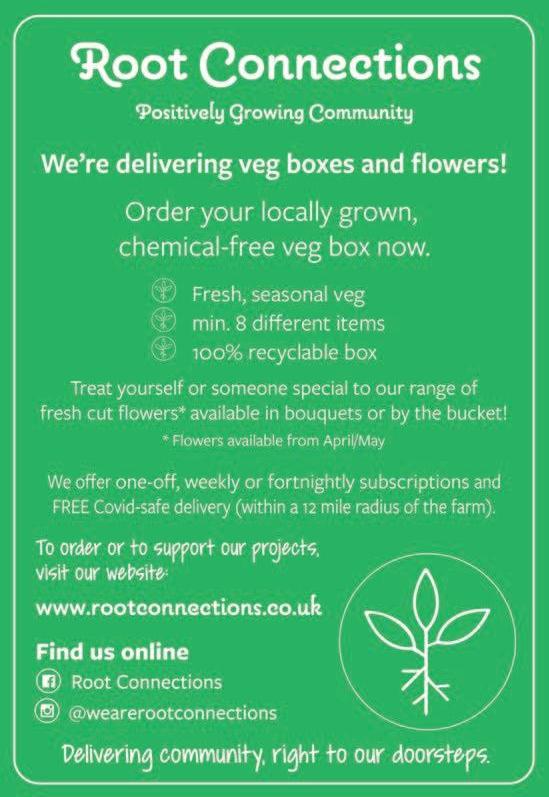
19 minute read
Food & Drink
Lockdown recipes

Janet Thornhill (left) and Jenny Harris
BISHoPSutton and Stowey WI members have published their own Lockdown Recipes booklet for group members to share.
President Jenny Harris said: “It is an amazing collection of much-loved recipes, starting with lettuce soup and finishing with the sophisticated zucchini (courgette) nut bread.”
Visit: www.somersetfarmersmarkets.co.uk


butchers * fishmongers * delicatessen
THANKING OUR CUSTOMERS NEW AND OLD FOR THEIR CONTINUED SUPPORT

open: monday –saturday 7am-6pm • sunday 10am-4pm e cross, union street, cheddar, somerset bs27 3na • 01934 742521 email cobbsofcheddar@outlook.com
A new image –and a new market!

Midsomer Norton Farmers’ Market returned in February after the New Year Break
SoMERSET Farmers’ Markets have developed a fresh, new, recognisable brand for their network of markets which celebrates the diversity of its food producer members.
And it can boast a recent addition to its roll-call – Nailsea takes pride of place in the town’s High Street with road closures in place and has become one of the biggest in the area with the capacity for 34 stalls.
A cheerful basket of local produce is at the core of the new SFM logo. Additional icons illustrate the breadth of food production in Somerset, from cheesemaking and strawberry growing to tractors and baking. Each of the monthly markets has been branded with a distinct colour represented Carla Masters, of Easton near Wells, made her farmers’ markets debut at Midsomer Norton with her Pig Patch Pigs stall on their leaflets, verge signs, website page and banners to maintain their distinct identity within the countywide network.
The markets take place on a monthly rotation: the first Saturday sees Axbridge and Midsomer Norton; Keynsham and the Frome Cheese & Grain take place on the second Saturday with Crewkerne and Nailsea on the third and Burnham-on-Sea on the fourth.
The markets reopened after the first lockdown in July and the team has continued to work extremely hard with its members to be Covid-safe.

For details, visit: www.somersetfarmersmarkets where shoppers can sign up for a newsletter for their local market.
Fruity winter warmer
With ADRIAN BOOTS
GIvENthe fantastically cold weather we have experienced recently, the snow, frosts, frozen icicles on hedges and the wind chill of minus 8 or more (or is that less?), it has been a tough time for the forager. But don’t feel too sad, think how the wildlife feels! The birds are hungry, snowdrops and crocuses are out and the daffodils sent up exploratory shoots then thought better of it.
Even with the super cold weather some shrubs have kept their berries, which is great for wildlife and forager alike. So I reminded myself about one of my favourites, the shiny red cowberry.
Cowberry, Lingonberry (vaccinium vitis-idea) is a small creeping evergreen shrub up to about 40cm. Leaves are elliptical to oblong, dark green above paler beneath, edges rolled under. Clusters of small bell-shaped pink to white flowers appear May to June. The red fruits are small and rounded. So what’s so special about it?
Well apart from the beautiful and wild landscapes you find this berry in, they contain high levels of vitamin C and a natural preservative and as such store really well without the need for preservatives or freezing. Warning – they are not naturally sweet!
Now, if you don’t manage to forage for cowberry yourselves (and who could blame you due to geography and the bone chilling wind) then I have a solution for you. Go to the freezer and check out that packet of frozen garden or hedge-picked fruit you had forgotten about: blackberries, black currants, red currants, raspberries etc.
Put it all in a pan with water and a few tablespoons of sugar. We are not making jam here but a cordial! Strain through a fine sieve and store in bottles. So next time you go out for a walk in sub-Arctic conditions forget your usual tea or coffee, take a flask of this fruity winter warmer with you instead.

Adrian Boots is a Landscape Ecologist, Wild Food Forager and Adventure Activity provider. You can visit his website: www.gowildactivities.co.uk to learn more about wild food foraging and activities you can do with him on the Mendip Hills.
So easy to grow
RADISHESmust be the easiest, quickest and most foolproof vegetable that it’s possible to grow. The classic “French Breakfast” variety was the very first vegetable I ever grew, when I was six years old, and thinking back on it With JAKE WHITSON now I realise that feeling of satisfaction, the easy gratification of growing food in just a few short weeks, may well have been the spark that set me on the path I’m still on with food.
We planted a pink, finger-shaped radish called “Rosa” very late last year, in late october, for use over the winter.
I thought we’d planted them rather too late as going into December they looked extremely small, but they are hardy little things, making a lot from the extremely limited light and warmth, and gradually thickened up so that we’ve been picking bunches of lovely finger thick radishes from late December onwards. We’re just getting through the last of them now – they make a lovely addition to sandwiches, or eaten on their own with cold butter and salt. Pictured here is our valentine’s day starter – steak tartare with finely chopped red onion, wholegrain mustard, capers and chopped radishes from the garden – their peppery crunch goes perfectly with the unctuous raw beef and egg yolk.
Cooked radishes are something that are also growing on me – they are in fact very similar to turnips and can be used in many of the same recipes. There are even radish varieties bred just for cooking such as “Black Spanish Round” which grows to tennis ball size and is excellent grated up for stir fries in the winter.
Another type of radish that is completely new to me is the “Rat-tail” radish – this is grown for its elongated seed pods rather than the root. I’ve not had a chance to grow them yet but these are supposed to be crunchy and quite delicious – one kind is grown in Germany to serve alongside beer as a sort of healthy bar snack!

Jacob Whitson is a chef, food writer and smallholder –he divides his time between the Mendips and Pembrokeshire.



Root Connections: delivering food and a positive social impact
THE name of Root Connections – a unique, not-for-profit organisation helping to bring an end to rural homelessness –will soon become a familiar sight on roads around Mendip.
Thanks to the National Lottery Community Fund, the fruit and vegetable and cut flower provider has just acquired a new-look home van as it expands its service around the area, delivering fresh chemical-free produce, grown to organic principles on its 1.5-acre market garden at Stratton-on-theFosse. The produce now arrives in an upgraded, easy to handle, recyclable FSC certified cardboard box.
Despite the many Covid-19 challenges that have faced Root Connections over the last 12 months, the organisation and its team of volunteers has continued unwaveringly in its mission to improve the health and wellbeing of those who are homeless or rough sleeping.
Suzanne Addicott, Roots Connections’ founder, said: “We’re building on our work over the last two years and widening our reach – including creating learning and development opportunities for our volunteers, while actively supporting the Dairy House, a local rough sleeping hostel.”
Since January this year, funding from Somerset Skills & Learning has enabled the community interest company to offer volunteers and residents a programme of Social and Therapeutic Horticulture Practice, led by a dedicated Roots Social and Therapeutic Practitioner in partnership with UK gardening charity Thrive.
Root Connections is now also a base for City & Guilds Level 1 in horticulture training, a learning pathway open to volunteers and residents alike, offering a tangible next step in peoples’ lives.
Suzanne added: “It’s such an exciting time for us here on the farm and for our volunteers. our focus is very much on getting our fantastically fresh, locally grown produce out into the local community; we run three deliveries a week, across four routes within a 12.5 miles radius of the farm and don’t charge for delivery. Every penny we make from sales of our produce goes back into making a positive social impact –what’s not to love!”
As fresh as it gets: a Root Connections vegetable box
Family cider firm back in business
Brakes Cider has been relaunched by Joe Brake, 40 years after the business came to an end with the retirement of his grandfather’s cousin, Leonard Brake.
BASEDin Nailsea it ran successfully for over a 100 years, having been started by Leonard’s father Walter Brake in the late 1800s. The business blossomed with Leonard taking the reins in the mid1900s.
Brakes used about 200-300 acres of orchards yearly and with the help of half a dozen employees would harvest and press the fruit they needed. In times of local shortage they would venture through Somerset and Devon country buying up apples, even importing apples from France if there was a real shortage.
Brakes supplied over 60 pubs in Bristol and North Somerset and held the best draft cider trade obtainable in Bristol for some time. Hundreds of gallons a week would be sent in to Bristol in cask barrels on horse and carts in the early to mid-1900s.
As well as cider, Walter Brake and his brother, Alfred, farmed around 350 acres between them in the West End of Nailsea. Walter and son Leonard ran 200 head of beef cattle that they would feed the apple pomace when cider making.

They would also show a lot of cattle and took many a prize at Christmas time. Len Brake was a wellknown figure around the markets. Walter’s brother, Alfred, and his son, Jack, farmed a dairy herd at Youngwood Lane that went on producing milk up until the late 1990s.
A double screw press is still present at the farm there today. It made cider for farm workers and personal consumption! Today only about ten acres of orchards that Brakes used to use are left standing locally.
Joe said: “Bringing back Brakes cider is something I’ve wanted to do for some time now.
“It would have taken a long time and a lot of hard work to build a business to that scale with the amount of trade it had years ago, so it’s just nice to see it going again in some form.
“It’s also a good feeling that I can get apples from an orchard today that would have been harvested to get apples for Brakes cider 50 years ago. It was also nice to learn the Wurzels liked a drop of Brakes cider at the Royal oak in Nailsea where they used to record some of their music.
“I never got a chance to meet Leonard as he passed a few years before I was born, but I still see his grandchildren and family. I visit Leonard’s daughter Isobel and she tells me some great stories about her father. I also hear many other stories from folk around here about Len!
“Starting again has not been the easiest thing to do but I’m lucky to know enough people who have been a great help to me and made it that bit easier to make this happen. It’s been welcomed by many and the local support has been great.
“I managed to get into six or so pubs, four rugby clubs and several farm shops before we went into another lockdown which has bought most of that to a halt! When all this over I hope to push on with getting Brakes cider in few more places!”
Brakes Cider will be available throughout North Somerset in various establishments. An orchard blend of a sparkling medium sweet, West End Tipple, and a farmhouse dry, Youngwood Tipple, are currently available. l A voice recording of Leonard Brake from the 1970s talking about Brakes Cider can be heard on Somerset voices: www.somersetvoices.org.uk and search Leonard Brake.

Joe Brake



Len Brake delivering cider in the 1930s Cleaning the barrels, Len and Walter Brake with workers St Mary’s Grove 1923



Village store reopens

THE village shop has reopened in Chewton Mendip thanks to Nikki and Gerhard Perold, who live across the road in the village
with their children Zara, Brooke and Adam.
The Mendip Pantry stocks a wide range of essentials, fruit and vegetables, newspapers, meals, cakes, home-made pies and fresh milk. Gerhard has also moved his Perold Wine Cellar business there from nearby Rookery Farm.
They hope to open a small café eventually and currently offer takeaway breakfasts and lunches, with very popular takeaway dinners on Fridays. The cyclists are back – and so are the villagers.
Gerhard said: “We are part of the community and after a very long wait while the shop was closed we wanted to be able to give the village a really good shop.”
Nikki, who still works part-time at Mendip Auction Rooms, said: “Everybody has been so supportive, with the demand for meals on Fridays quite overwhelming.”
The The Mendip Mendip Pantry Pantry
SHOP | CAFÉ | WINE | DELI
Fresh local produce and homemade food Suppliers include Arthur David Taylors Bread Farmhouse Dairy Mitchards
Takeaway breakfast, lunch and Friday night specials The Stores, High Street, Chewton Mendip BA3 4LJ 01761 240820 www.peroldwinecellar.co.uk
Gorgeous coffee and teas
ToM Anderson had hoped to open his Wyvern Coffee Co. shop in Cheddar Gorge last March, but was stopped by the first lockdown. But since he did manage to open last June he says support has been fantastic, from visitors and especially from local people. Tom, aged 29, lives in Cheddar and attended Fairlands and Kings of Wessex Schools. He was a portrait photographer previously, specialising in live music and dance, before he decided to pursue his love of coffee.
He describes the shop as the home of the finest quality fresh coffee beans, loose teas and artisan hot chocolate, with a choice of 13 coffees and 36 teas. Tom gets help in the shop from parents Bill and Kelly and his partner Marcus.
He said: “I couldn’t have asked for more support from the village.” During lockdown he’s taking orders online, with free local delivery.


Time to take action on palm oil
SureLy this is going to be the year when many of us humans have to make a lot of changes to our lifestyle, to what we buy, to what our priorities are. The pandemic may have taken much out of us, have taken many away from us, but as the saying goes: for every action there is an equal and opposite reaction.
The pandemic, when viewed with the Climate and ecological emergency and the impending economic situation, has been a seismic event all around the world, but if you want to use the word apocalypse it is interesting to note that this word, coming from the Greek, means revelation, a disclosure, a revealing, an illumination.
And when we slow down a bit (as Covid-19 has dictated we do) and take time to look around us, literally and mentally, we may see things a little clearer than when we were rushing about in a blind panic trying to make ends meet, going for broke or striving for more and more economic growth.
The ends aren’t meeting any more for some people; those who felt they did not have to cut their coats according to the cloth available now have to (although not government of course) and those who felt constantly taking resources from the planet and then taking even more with no thought of replenishment or putting back was the correct way to behave are now having to think again.
Much is being revealed: inequality is just one of those situations being illuminated, along with injustice, animal abuse – especially in some farming industries – wildlife abuse, overconsumption, overuse of chemicals and antibiotics, pollution of soil, air and water, and fire wreaking havoc in forests the world over, especially in tropical rainforests which are the lungs of the world.
To name just a few of those aspects – rainforests, inequality, injustice, air and soil pollution and overconsumption – I would like to highlight the use of palm oil.
We humans can make a difference here by being aware of the damage the massive use of palm oil is doing to the planet and to people’s lives. rainforests are being destroyed and replaced by sterile acres of oil palm trees (corrupt governments allow this to happen although they know the consequences); wildlife, including our nearest relation the peaceful orang utan, is being wiped out; those who work harvesting the palm oil are subjected to poor working conditions, low pay and the pesticides used are affecting their health (no union support for them); overconsumption by a growing population buying shampoo, soap, biscuits and hundreds of other products without checking ingredients used is fuelling all this appalling destruction.
It is possible to buy products without palm oil in. And we have a voice; if you care at least make a comment. I looked for bar soap in Waitrose, Wells, the other day and not a single bar did not include palm oil. The soap in a bottle did not include it, but I did not want to purchase yet another plastic bottle. I made a comment to customer services who appeared aware of the issue, understanding and supportive.
I never buy biscuits or cakes containing palm oil now and make my own at home – they are always cheaper and usually edible! I know we have to use an alternative like butter (also an issue as it’s dairy) or rapeseed oil, or sunflower or olive oil, but in our house we have halved (or more) our consumption of biscuits and cake and are the better for it. If we have less of something we value it more.
My mother, aged 89, ordered some soap for me, by phone, as a Christmas present, from the well-known garden roses company David Austin. She specifically asked if their soap contained palm oil and was assured no. I received the soap, which smelled gorgeous, rang my mum to thank her but mentioned it was a shame the soap contained palm oil.
She was horrified and annoyed, rang the company immediately to remonstrate with them and was told they would look into their suppliers and apologised profusely. I was impressed with my mum for being so caring and making such an effort at her age.
If in 2021 we can all make this sort of effort, be this caring, be aware of what’s going on, and make some small changes, then we can turn this situation around and improve the lives of all who depend on a clean, healthy, equitable and unpolluted planet. And that’s all of us, surely?
Laura Sørensen Meare
Take your litter home
I enjoy reading the Mendip Times. Like very many of your readers I live in a rural setting. We have of course noticed an increase in walkers, runners, cyclists and horse riders in the last year as would most readers in similar locations.
It is good that more people are enjoying our beautiful countryside, but sad that when you walk out you see how much extra litter is in the hedgerows and grass verges.
I am sure that the majority of your readers would not dream of leaving anything except a footprint while enjoying the outdoors. However could I suggest it would be useful if every time a walk is highlighted, or a cycle route, that the editor includes a brief reminder (if the contributor has not done so) to follow the countryside code.
It is only ten points but when observed it certainly makes for a more pleasant experience for everyone! Dear Mendip Times, During the pandemic, people have rediscovered the simple act of walking – the oldest, cheapest and greenest transport there is. It has allowed us to stay healthy, happy and connected to those around us.
But lots of us still struggle with narrow, cluttered, uneven pavements; crossings that prioritise cars rather than people; and growing numbers of speeding vehicles.
That’s why I support Living Streets’ Manifesto for Walking, which calls for candidates in our upcoming election to pledge to end pedestrian deaths and injuries on roads, tackle air pollution, make school streets safe and make walking easier by cutting the clutter on our pavements.
It is time we redesigned our streets around people not cars. That way we can all continue to enjoy the benefits of walking and healthier, happier communities.
Entries invited for Mendip’s Fine Wines and Sporting Sale
FINEwines and sport are two great interests that many have and Killens will be hosting a sale of Fine Wines, Spirits and Sporting items at an evening sale on April 22nd. Entries are invited and do contact Craig Lear, one of the valuers at Killens’ Mendip Auction Rooms, for further advice.
In spite of the lockdown, Killens have had a busy February with three sales held with incredible prices achieved at all. With all sales being held online only, there was fast bidding for all items as buyers spend more time at home. Quality or the interesting continues to sell particularly well and a good example of that was a 20th century leather chaise longue, possibly of Danish design, in need of improvement that achieved £1,900 at the monthly Fine Art sale.


At the time of writing, it is still not possible to attend the auction rooms for valuations, viewings or sales but it is possible to deliver and collect items. The team at the auction rooms look forward to opening up fully once it is safe to do so and do keep an eye on the auction rooms’ website for the latest news. Alternatively, sign up to the Killens regular email newsletter ensuring that you receive the latest auction catalogues.
Deliveries can be made to the auction rooms between 10am and 5pm each weekday. In addition, senior valuer, Neil Grenyer, is out on the road conducting home visits free of charge whilst Aaron Rogers and his team undertake house clearances.
The team at the Mendip Auction Rooms aim to make selling and buying at auction straightforward.











